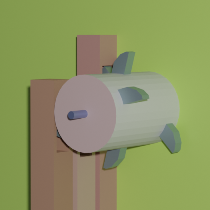
... further steps
in 2022
... two and two
the first wheels
MT18, wheel in wheel
MT18 with two arms
MT18 with three arms
Sketch of wheel 1
AP wheel in 3D
back to next steps
back to startpage
| back to german |

© 2022 by Alois Zimmermann | Kontakt | Impressum | Updates | Ausblick |
MT18, the wheel within the wheel
It’s been almost four years since I covered MT18 on the Durchbruch (breakthrough) page. MT18 is certainly one of the most important sketches Bessler left behind. So here again is the original image with the side notes of him that underscore its importance.
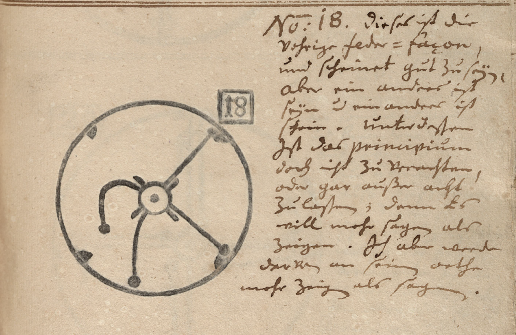 |
No: 18. This is the previous spring=Façon, and seems to be good, but another is Be and another is appearance. Nevertheless the principle is not to be despised, or even to be disregarded; for it wants to say more than show. But I will show more of it in its place than I will say. |
We know that it cannot work so simply. Bessler would never have left us
the secret unencrypted.
But he has shown perhaps a partial function, an important principle in it.
And recent simulations with Algodoo have confirmed it impressively:
MT18 shows structure and function of an unbalance wheel
in the Bessler wheel.
Step by step I want to show here how I got on the track of the function
with Algodoo.
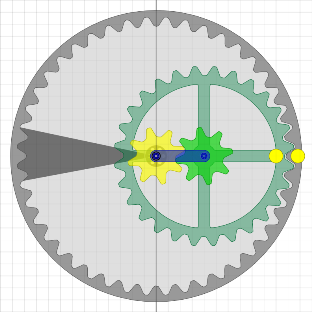
|
Here in the first picture the Bessler wheel is shown with the outer rim.
The green unbalance gear (wheel within the wheel) can roll off the outer gear.
The blue lever connects the shafts of the two wheels and has an additional
ratchet in the center working on the outer wheel.
The ratchet only allows the green gear wheel to turn upwards freely. For better orientation there are two more yellow markings on the gears. This configuration reminds me of Bessler’s verse in PA 88: „on one side it’s heavy and full/ On the other, empty and light ( as it should be/).” When the simulation is started, the entire structure slowly starts to move clockwise because it is heavier on the right than on the left. The ratchet is engaged, the yellow markings stay together. |
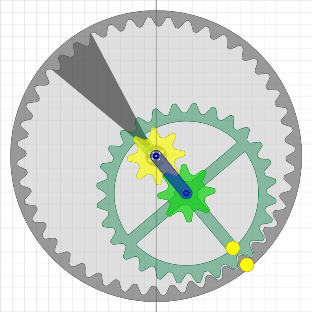
|
During this phase of movement, potential energy is converted into rotational
energy. You can say this is the power stroke.
When the yellow markings have then reached 4 o’clock or 5 o’clock, the unbalance gear has to be lifted again. Since the small green gear is connected to the unbalance gear, you only have to turn the small yellow gear and the unbalance will roll up again. This requires a lot of force and must be done quickly, since the outer wheel continues to rotate at the same time. Here I have the association with MT13 where Bessler notes: „... or someone would be present, who would lift the weight [at the top on D] always like lightning.” |
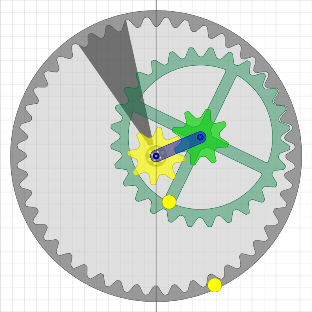
|
The energy for lifting comes from the inertia of the wheel.
The mechanics for this is not yet completely clear, but it can be said here,
that there will be a second unbalance gearwheel, which works phase-shifted
and provides energy exactly then.
A stamper unit controls the procedure and contributes power impulses at the right time.
When the drive of the yellow gearwheel ends, the ratchet engages and a new work cycle begins. Without thinking further, however, one can already say that nothing has been gained yet. The rolling up of the unbalance gearwheel costs as much energy as the power stroke can deliver. But we have not yet considered MT18. |
 |
Now we remember Bessler AP 81: „There are now always two and two/ When one thing takes the outer place/ So the other drives to the shaft/” So, as a next step, we make the unbalance gear wheel relatively light and place two flying weights (red) on it. To simulate the lifting, we place a motor in the bearing of the unbalance gear wheel, which can be operated with a cursor key. What have we achieved with this? There are now two different motion curves of the flying weights. The one from bottom right towards the center is very advantageous. Because of the pirouette effect this flying weight even wants to accelerate and gives off energy to the wheel. The curve of the second weight is more problematic. It has to move outwards and needs energy to do so. Centrifugal force only can contribute a little. |
If you want to play with this algodoo scene yourself, you can download it here.
(Download it to the download-directory and copy it by hand into the scene-directory of Algodoo).